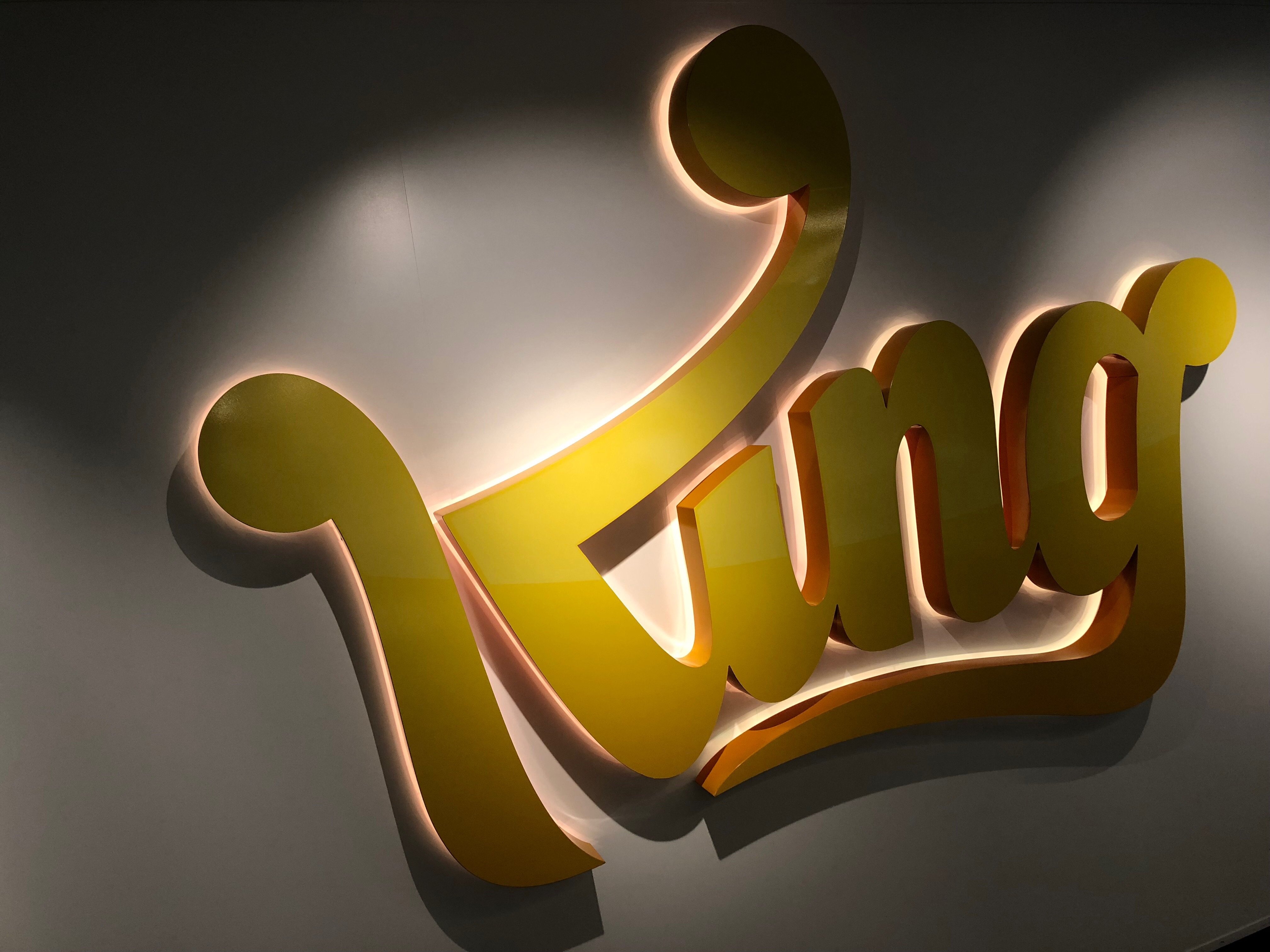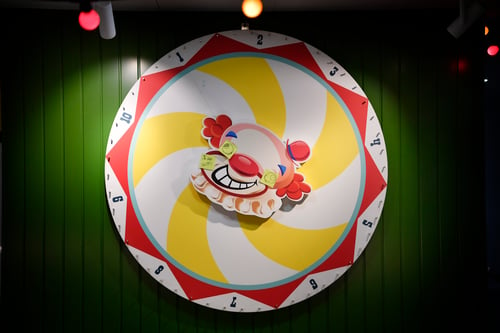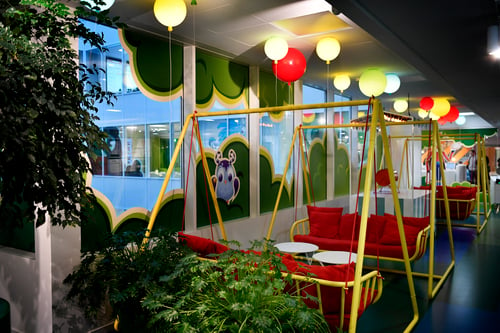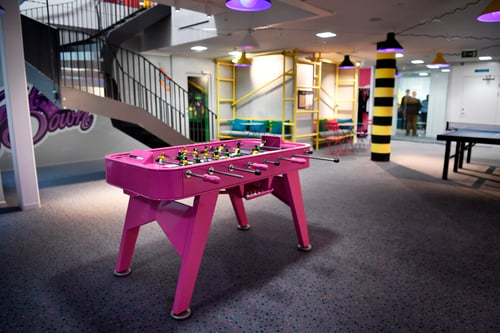Staying on top of your game isn’t always about presenting the flashiest technology. Sometimes, reinventing what already works is the road to glory. In the early Millennial shift between two major user platforms, leading entertainment company King did exactly that. The rest is gaming history. Or in their case, saga.
Swedish game developer King monetizes on in-game purchasing. In the last quarter of 2017, approximately 300 million users accessed King’s gaming apps. Their perhaps most famous game, Candy Crush Saga, has been downloaded 2.7 billion times and the company’s success story is literally on a level of its own. We met up with co-founder Sebastian Knutsson at the King headquarter in Stockholm to talk about challenging the industry, thinking outside the (x)box and making easy access games that everyone enjoys.

Hi Sebastian! Please talk us through the early years at King when you started sharing your web portal.
“King was founded in 2003, developing browser-based games. Two years down the road we were already as big as the Americans. That was the starting point and then it sort of exploded. At this point in time, there wasn’t much revenue from advertising on the web, but many of the early major web portals such as Yahoo! and AOL, as well as local ones, had a lot of traffic in their gaming channels. We figured we could make a player offer that fit their channels and share the revenue. It was a fairly free investment for them and it proved to work better for both parties than we ever thought.”
Basically, you saw a natural business opportunity and jumped onboard?
“Yes. For my part, it was about developing the site and refining the original business model. But I also got an opportunity to work on the games, which was great. The challenge was a blend of designing the entire product flow and seeing how it could serve the business model with revenue fair and game traffic. We needed to understand what attracted players and what made them feel we had the best gaming site, as well as how we could easily white label everything for different partners.”
“ We had to create something for Facebook, preferably around our existing games”
You were groundbreaking in producing casual games. Then you had to break new ground again.
“In the first couple of years, between 2003 and 2008, we had a healthy company growth with our simple Flash games, as we integrated our web solution into portals. But around 2009 in the US and 2010 in Europe, we began to see a huge loss in traffic to Facebook. We were still a growth company, in the mind, with investors, but we had stopped growing, so we realised it was time to reconsider our business model. Since we were still very profitable, there was no panic, but we had to reinvent the model from scratch and find a new offer that wasn’t dependant on portals.
We realized we had to create something for Facebook, preferably around our existing games. Back then, Zynga dominated 80 % of the gaming traffic on Facebook, so everyone said it was impossible to compete. Also, our simpler, casual games weren’t really that popular, it was all about FarmVille and such, at the time. Basically, we were too late with the wrong product. Our solution was for half the company to go on doing business as usual, while the other half ventured into this new arena to figure out how we could modify our games.”
“We set up six different projects to find the most suitable model. One of the six became the Saga format”
What was the work process like?
“After a kick-off in October 2010, where we explained that we needed to change everything, we decided it was best to invent the wheel in parallel. We set up six different projects to find the most suitable model. Trying one at a time would just take too long, and you also lose confidence if you fail and have to start over again and again.”
One of the six became the Saga format, but they soon realized that free traffic on Facebook was a thing of the past. Therefore, apart from creating the games, King also had to market them – something none of their competitors were doing. Most games were made by people who lacked both marketing budget and experience, so with a unique marketing strategy, King broke the convention and started catching up on Zynga and the rest. Bubble Witch Saga, the third Facebook release, became a huge hit.
“Once we knew the format worked, we could build a structure to work faster with parallel ideas and create several saga versions of our existing games,” Sebastian recalls.
“And then came the mobile challenge ...”
So, adding a format and a storyline to an existing game was something unique?
“Yes, it was new to us too. We hadn’t done it with our previous games, but saw that this format worked well and started focusing on refining it. Instead of seeing each game as brand new and starting from scratch with a brand new idea, we saw what worked and how we could improve it. Each time we did, we tried to further develop the format, little by little. And then came the mobile challenge ...”
Yet another success …
“We were actually late on both occasions. Everyone told us we’d missed the train, but we never saw it that way. When we tried our business model on mobile gaming, people were already used to paying once and get the game. As a game developer, you were pretty dependant on Apple or Google to promote you to get traffic. People told us the way we’d marketed Candy Crush wouldn’t work on phones, that our kind of casual games wouldn’t attract, and that we were pretty much screwed without the support of Apple. So, stupid as we were, we asked ourselves: What would happen if we just do like we always do instead?”
“ After their second mobile game release, Candy Crush Saga, King had bought 30 % of all mobile banners in the world”
As always, it worked. Soon after their second mobile game release, Candy Crush Saga, King had bought 30 % of all mobile banners in the world (!) When it came to marketing, they were by far the biggest company in the industry, and no one else really worked that way or had such a product range. They had a four-month payback on each marketing dollar spent and a product under constant development.
Targeting the Talent
Today, King has offices in Stockholm, Malmö, London and Barcelona. The talent works in studios, often in various projects at a time. But like in any line of business, finding and attracting the very best is a full-time hassle.
“Talent is everywhere and not isolated to one place, so we look globally for it in every way possible”.
“Our studio teams range from about 50 people up to 300 here in Stockholm. Perhaps it would be easier to have everyone under one roof, but it’s not really a possibility and working this way has its advantages. Talent is everywhere and not isolated to one place, so we look globally for it in every way possible. Today, 50 % of our recruits come from outside of Sweden and one way to attract them is to let them choose the project or location that appeals to them.”



What about the work routines? Is it different for each team?
“Many rotate and start working on new games, only to come back later. It’s really about what motivates each individual. Normally, each studio is working on a live game where you continue to produce content every day, as well as on new game ideas to test on the market and see if they’re good enough to promote and release. Eight developers can work on a game like Candy Crush originally, and five years later it requires 100 people.”
Do you balance between generating revenue and securing the future?
“Yes, but our original idea of Facebook was that a game would live for six months before we had to come up with the next one. Today, our five year old games are stronger than ever. We’ve done a lot of mistakes along the way, but adapted. It’s learning by doing.”
“Even if we have teams that focus on new ideas from gaming contractors, we only pick up a handful that way.
According to Sebastian, the biggest change since then is what it takes to actually release a new game. The competition is tougher, users have higher demands and the major companies have become better on marketing and on establishing their products. Small independent studios with five people can still get a game on the top list, but they won’t stay there for long without a big backer. So for anyone sitting at home with an idea for the next great gaming adventure, the chances of turning dream into reality are sadly rather slim these days.
“Even if we have teams that focus on new ideas from gaming contractors, we only pick up a handful that way. The problem is that it takes at least a year to test the market and another year to fine-tune the game. No one ever comes in with a finished game that’s already good, it doesn’t happen that way.”
“Of all the creation at work on King, only 20 % of the games ever see the light of day”.
Inhouse, it’s a different story. King has special teams only for testing new ideas, without any real expectation to pitch them. Others work more formally and try to come up with ideas to be presented and hopefully even launched in the near future. Sebastian talks about a calculated risk and the balance between safe bets and crazy ideas that might turn into the next big thing. Of all the creation at work on King, only 20 % of the games ever see the light of day.
So what decides that 20 %? What’s the secret to a great game and how do you speak to a potential audience of several millions spread across the globe? Perhaps surprisingly to some, King’s winning concept has little to do with either characters or the latest technology.
“We have never built a game based on a character. We start by creating a game that engages and becomes fun. It’s an experience and a business model at the same time. Of course, a certain character can extend the franchise and become a natural glue between multiple games in the same universe.
“A good game will always be a good game, then you can add more or less powerful graphics. But you can’t do the opposite – compensate a bad game with nice graphics”.
And technology exclusive for high-end devices isn’t for us. What we do is look for opportunities in popular games that aren’t produced on the market anymore. If everyone loved it five or ten years ago, and no one’s made a good mobile version of it, we see a possibility. It’s basically a reimagination of an old genre to mobile. Supercell’s Clash of Clans is a fine example from a competitor. It’s a way of reinventing the real-time strategy genre by letting you complete the different missions in a matter of minutes.
“We don’t prioritize new technology like VR”.
Good games are evergreens and that’s why I’m talking about reinventing genres. A good game will always be a good game, then you can add more or less powerful graphics. But you can’t do the opposite – compensate a bad game with nice graphics. Many of the games that have been successful on mobile haven’t been as dependent on the graphics as maybe the console games.
When we create a game, it must work for everyone, including those with low-end devices. That’s why we don’t prioritize new technology like VR. We look for the smallest common denominator rather than go to the forefront of technology.”
And you guys seem to have a sweet tooth. How do you decide on a theme?
“For Candy Crush, the original task was to create something appealing that everyone felt positive associations to and understood. Candy can be as glossy and shiny as a jewel, but it is also something familiar that everyone has a positive connection with. The choice of candy was quite conscious.
Choosing a theme where the player has a mental map of how the world should work is another tool to make the game more accessible. To me, it makes more sense taking care of a farm than jumping around like a space pirate in a fictional universe. The more complex you make the theme, the more niche it becomes. Our goal has always been to do something that everyone can play at anytime on the phone, where you just switch on and off whenever.
The challenge has been to identify something fun and then start removing things from the concept to make it even easier, rather than putting cool features on the top. If you go that way, you’ll just end up losing 5 % of the traffic.”
“We try to avoid adjusting the games so we don’t have to sit and make custom versions for the different markets”.
But is there really such a thing as a global theme? Can a game work everywhere and appeal to everyone?
“Everyone may not have the same idea of what a candy fish is, but the palette certainly appeals globally. The theme must look attractive and simple enough for people to try the game. Characters are more sensitive depending on the market. We try the concepts in different parts of the world, and perhaps the use of a pig theme wouldn’t appeal to the Arab countries. It’s things like that you have to consider when you start playing around with cute animal ideas. Some markets prefer bigger eyes or more realistic characters, etc. We try to avoid adjusting the games so we don’t have to sit and make custom versions for the different markets. We want a global expression that works and try to avoid mistakes that will come back to haunt us.”
Social Responsibility and the Future of King
How to balance between creating engaging games that become profitable and social responsibility?
“We talk a lot about these things internally. But there is a difference between us and, for instance, gambling companies. Our business has never been about having few users spend a lot of money. It’s been important to us to design games that you can actually complete without paying. We have ethical guidelines for our designs, and paying should be an option, never a requirement.
Last but not least – what are your predictions for the near future in gaming? What’s the next step for King?
Social interaction in the mobile gaming world is very interesting – the opportunity to play more together. I don’t think our players desire more complex games or fancy graphics, they just want to play with others instead of sitting alone. It’s a great challenge to take it from a one-man experience to a social game.”
Heading back towards the BBH office on the tube, we realize that a large number of the people on the train are probably busy playing one of Sebastian’s games as we sit there. We talk about the mind-boggling impact companies like King have on modern society, and how both of us are yet to finish level 10 on Candy Crush.